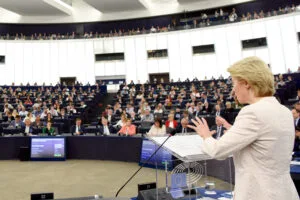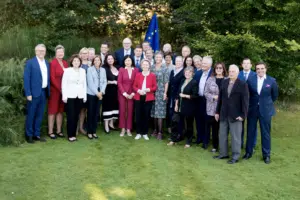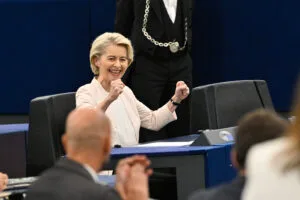Brussels – The (at the moment) non-existent response by EU governments to the request of the re-elected president of the European Commission, Ursula von der Leyen, to have each member state propose a man and a woman as commissioner candidates to more easily achieve the stated goal of gender equality in her second consecutive cabinet is becoming a case. However, looking back five years – to the summer of 2019, when newly elected president von der Leyen was putting together her first team of commissioners – the situation was not much better, quite the opposite. The request was the same, the response was the same as today.

“If the member states do not propose a sufficient number of commissioners, I will not hesitate to ask for new names,” von der Leyen warned, speaking for the first time at the plenary session of the European Parliament in Strasbourg on July 16, 2019, just before the MEPs’ confirmation vote. On that occasion, the German politician made it clear that she would want one male and one female candidate from each of the 26 governments (exceptions were Germany, which held the Commission presidency, and Spain with the new EU High Representative for Foreign Affairs and Security Policy, both appointed by the European Council), setting out the priority of gender equality in the future College of Commissioners she would lead. “Since 1958, there have been 183 commissioners, only 35 were women, less than 20 percent,” the new Commission head attacked, “We represent half of our population. We want our share.”
The response from governments had been anything but welcoming: Only Romania put forward two candidates – Rovana Plumb and Dan Nica – a choice reiterated in November after the rejection of the former (by the EU Parliament) and the second (by von der Leyen), with Siegfried Mureșan and Adina Vălean, the latter later becoming commissioner for Transport. The United Kingdom, ahead of its leaving the Union on January 31, 2020, decided not to nominate any candidates, leaving the position vacant in the first two months of the von der Leyen Commission. In any case, there was almost gender parity in the list of appointed commissioners – 12 out of 25 – thanks to the intensive mediation and persuasion by the Commission chief, who convinced several governments — including Sweden, Portugal, and Malta — to submit only one female commissioner candidate.

However, the goal failed with the rejection of the French nominee, Sylvie Goulard, at the European Parliament hearing, with the only nomination of Thierry Breton (later to become Commissioner for the Internal Market) taking her spot. The ratio of female commissioners in the first von der Leyen cabinet came to 12 women (including the chair herself) and 15 men (including Spaniard Borrell) before finally settling at 13-14 as Ireland’s Mairead McGuinness took over after the resignation of Phil Hogan in 2020. Seven governments (Austria, Bulgaria, Denmark, Ireland, Latvia, Czech Republic, and Slovakia) had availed themselves of the implicit exception to von der Leyen’s request on gender equality for commissioner candidates, confirming their respective outgoing commissioners, including three female commissioners (Mariya Gabriel, Margrethe Vestager and Věra Jourová).

Five years later, following the re-election as European Commission president on July 18, von der Leyen presented the 25 governments with the same request as in 2019, not only in a press conference in the European Parliament but this time also putting it in writing in a letter addressed to heads of state and government. Governments should submit one man’s and one woman’s name by August 30 to enable them to compose a College with an equal number of male and female commissioners. Exceptions are only those governments that decide to confirm the outgoing commissioners.
In addition to Germany, which will express the president of the Commission with Ursula von der Leyen, and Estonia, which will see former prime minister Kaja Kallas become EU High Representative for Foreign Affairs and Security Policy – both appointments are the responsibility of the European Council, which chose them at the June 27 EU leaders’ summit – to date, official endorsement has come from 14 governments of Slovakia, Latvia, Slovenia, Ireland, Sweden, Finland, Netherlands, Czech Republic, Malta, Hungary, France, Austria, Greece, and Croatia. None of these governments, however, complied with the re-elected president’s request on the double name, and with 11 nominations still missing, von der Leyen has on the table the resumes of 11 men and three women (rising to five with High Representative Kallas and the president of the Commission), including five confirmed male and one female commissioner (Slovakia, Latvia, the Netherlands, Hungary, France, and Croatia).
The candidates for the second von der Leyen Commission term
As for the 14 names that have come in so far, Slovakia has re-nominated the outgoing executive vice president of the EU Commission responsible for Inter-institutional Relations and the Green Deal, Maroš Šefčovič, potentially making it his fourth consecutive term. For the third time in a row, Latvia chose the outgoing executive vice-president from the EU Commission responsible for the Economy, Valdis Dombrovskis. Slovenia proposed a new name, lawyer and economist Tomaž Vesel, former president of the National Audit Office and Fifa’s Audit and Compliance Committee. Center-right representative, Fianna Fáil, and former minister for Public Expenditure and Reform (2020-2022) and Finance (2022-2024), Michael McGrath are the candidates from Ireland. The government of Sweden decided to bet on the minister for European Affairs, Jessika Roswall, while for Finland, on the MEP, who has sat in the ranks of the European People’s Party since 2014, Henna Virkkunen.

The new right-wing government of the Netherlands chose the outgoing European Commissioner responsible for Climate Action, Wopke Hoekstra The Czech Republic chose the Minister of Industry and Trade serving from 2021, Jozef Síkela, while Malta selected the head of the prime minister’s secretariat and Labour Party member, Glenn Micallef. Despite great skepticism over the the green light in the European Parliamentary hearing, Hungary confirmed the outgoing European Commissioner responsible for Enlargement and Neighborhood Policy, Olivér Várhelyi. Just as controversial is the choice of France, whose President Macron has renewed confidence in the outgoing European Commissioner responsible for the Internal Market, Thierry Breton. Croatia also confirmed its outgoing EU commissioner, Dubravka Šuica, the incumbent transport commissioner. Greece opted for the governor of the Central Macedonia region since 2013, Apostolos Tzitzikostas, while Austria nominated the incumbent finance minister since 2021, Magnus Brunner.
The right-wing government of Italy headed by Giorgia Meloni has not yet announced nor when it will announce an official candidate. However, speaking exclusively with Eunews, Forza Italia’s head delegation to the EU Parliament, Fulvio Martusciello, said: “The commissioner should be Minister Raffaele Fitto. We have already debated it extensively, and it will be him.” Fitto is the minister for European Affairs, Cohesion Policies, and the and a part of Fratelli d’Italia, the most significant partner in the governing coalition with Forza Italia and the League that took office on Oct. 22, 2022. He held the office of MEP between 1999 and 2000, and then between 2014 and 2022 (from 2019 co-chair of the European Conservatives and Reformists group), he was president of the Puglia Region between 2000 and 200. He was also minister for the Regions and Territorial Cohesion between 2008 and 2011 in the last government led by Silvio Berlusconi.
English version by the Translation Service of Withub









